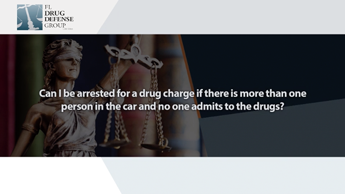The Fifth Amendment And Drug Cases

When police officers recite the Miranda warnings when arresting someone that they suspect of committing a crime, they tell the defendant that he or she has the right to remain silent. In that situation, the purpose is to let defendants know that they have the right to consult with a lawyer before answering questions from police about the alleged crime. The Fifth Amendment to the Constitution protects your right to refuse to answer questions from police, prosecutors, or other agents of the state in many situations. It states that the state cannot force you to say things that would lead to you being charged with or convicted of a crime, and if an official asks you directly about something where answering truthfully would constitute evidence that you committed a crime, you have the right to refuse to answer. Pleading the Fifth Amendment means refusing to answer a question during an investigation, court hearing, or trial, in order to avoid saying things that could be used against you in criminal court. Defendants and witnesses can plead the Fifth in civil and criminal cases, including drug crimes cases. A Florida drug offense attorney can help you decide what to say and what not to say in your case, including when to plead the Fifth Amendment.
When and Why Should You Plead the Fifth Amendment?
You have the right to plead the Fifth Amendment in situations where anything you say can be used against you as evidence that you are guilty of a crime. This means that, if you are a defendant in a criminal case, you can invoke the Fifth Amendment in response to questions from police after your arrest, or even at your trial. This is why you should always have your lawyer with you when discussing your case with police, investigators, or prosecutors. Your lawyer can decide, upon hearing each question, whether it is safe for you to answer the question or whether you should plead the Fifth Amendment.
You can also plead the Fifth Amendment if you are a witness in an ongoing case against someone else, whether or not that person has already received criminal charges. If you receive a subpoena to be a witness in a case, you must respond to it, but you do not have to answer any questions if answering could lead to you being charged or convicted of a crime. If you plead the Fifth, the state cannot use this as evidence to charge you with a crime. If prosecutors really need your testimony to support their case against a defendant, they might offer you immunity, meaning that they promise not to charge you with a crime even if you speak about criminal activities in which you were involved.
Contact FL Drug Defense Group About Investigations in Drug Cases
A Central Florida criminal defense lawyer can help you if you are being asked to participate in an investigation in a drug case. Contact FL Drug Defense Group in Orlando, Florida to discuss your case.
Source:
law.cornell.edu/constitution/fifth_amendment







